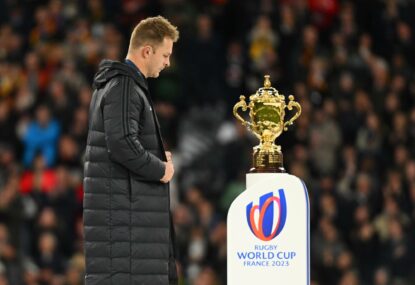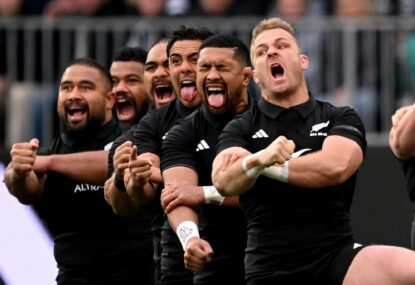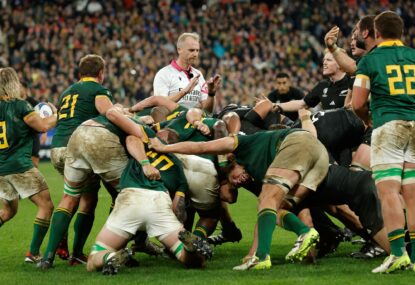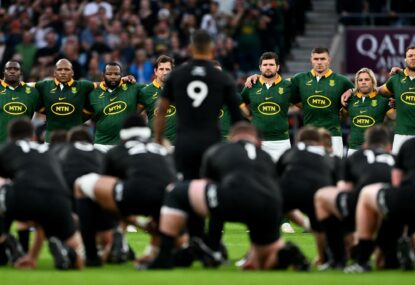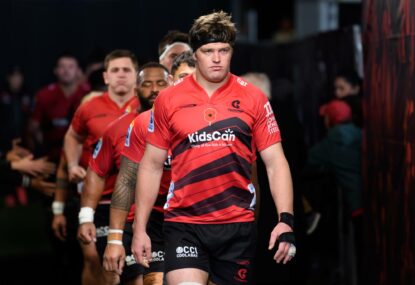As Italy march into Christchurch, a New Zealand team that is under a surprising amount of pressure will revel in their final hit out before a challenging Tri Nations defence looms.
France have arrived in Australia issuing high praise in regard to the Wallaby team, with headlines abundant about how the Wallabies are either tougher or a better side than the All Blacks.
On the surface of this, it’s a pretty obvious remark.
Of course the Wallabies are a better team than the All Blacks as it stands.
While many like to croon that it is just an excuse, the reality is that New Zealand are without key men, players who have been instrumental in establishing the All Blacks overall dominance – World Cup withstanding – during Graham Henry’s reign.
What appears to have been proven is that the second tier of players, which Henry had painstakingly built up over 2005 and 2006, are not as good as the vital cogs of the All Blacks machine.
We might not have thought this over a year ago, but without Richie McCaw, Dan Carter, or even Rodney So’oialo, Ali Williams and Sitiveni Sivivatu, the All Blacks are vulnerable.
And while only a small collection of players should not make a tremendous difference to a nation that prides itself on its rugby depth, and funnelling of players through its academy systems, ironically, this damage may have been caused by the landmark year of 2008.
It was a year where Henry was all but forced to shelve any concepts of rotation and growing depth, because an early assault by the Springboks and Wallabies forced the All Blacks to roll out and permanently field the strongest test team available.
So while the results came, winning 13 out of 15 tests, their illustrious depth at Test level caught up to the rest of the world.
And now, one could argue that they sit behind both the Springboks and Wallabies in terms of Test player resources.
Hence the benefit of what is occurring now for All Black rugby.
The holy trinity of Henry, Wayne Smith and Steve Hanson have no choice but to bring in the new blood.
By the conclusion of the third Test match of the year, it is likely that less than seven players would have made their Test debuts. This is to go with a further seven players in the current Iveco (home series) squad that have less than ten Test match appearances.
In the middle of what has now become the almost all important World Cup cycle, this will bring benefits for New Zealand rugby, especially considering the success of the Under 20 team and the fact that they have their Junior All Black team operating.
The only admonition in this is that come 2011, the All Blacks may again wield too much depth, which for any coach can cause issues with uncertainty as to your best Test team.
The critical factor for the All Blacks is to ascertain their best players, and recycle and decide now.
It must be decided whether or not the current team, the soon to be returning first choice players, or even the Junior All Blacks (which contains five ex All Blacks) and their new Junior World Champions are the future of New Zealand rugby.
A classic example here is Joe Rokocoko, a Test veteran and world record holder for most Test tries in a calendar year (17 in 2003). Already Henry has remarked that he needs to find form now, for there are a host of talented three quarters in the proverbial selection queue.
Otherwise young players in their peak, could leave New Zealand for other opportunities.
As for their Tri Nations opponents, while they may appear stronger now, much depends on what happens in the next month.
For the Springboks, they are playing in what could be considered the last great challenge for many of their players. Win or lose against the British and Irish Lions, will they view the Tri Nations as an inferior contest?
Or will it be the last year for the Springbok elder statesmen who will look to cap a Lions series with a title that defines Southern Hemisphere supremacy?
As for the Wallabies, they swap opponents with the All Blacks, and no doubt comparisons between the Bledisloe opponents will abound after the matches.
In this, Australia probably has a bit more to lose.
If they cannot beat the French, then the apparently immense progress the 2009 Wallabies have made will take a backward step.






























































































